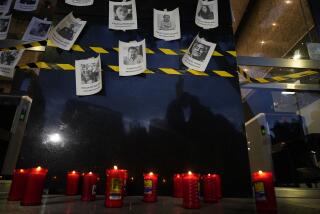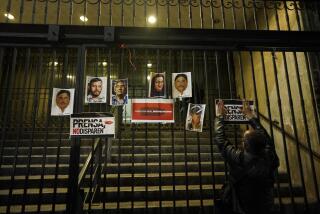Revenge Seen as Motive in Massacre of Mexico Family
- Share via
MEXICO CITY — Investigators probing the brutal slaying of a prominent author and her family said Friday that revenge--by drug traffickers or personal enemies--is among the possible motives for a crime that has shocked the Mexican capital.
Yolanda Figueroa, the author of a recent book alleging that Mexican government corruption delayed a top drug lord’s arrest, was found beaten to death Thursday in her home along with her husband and her three children, ages 9 to 18, in one of Mexico City’s most exclusive neighborhoods.
All five were beaten--probably in their sleep--with both blunt and sharp instruments, medical examiner Enrique Ochoa Orantes told reporters, adding that the family was probably slain Tuesday night. They were found late Thursday when police traced an abandoned car to their house in the capital’s Pedregal district, home to the stately mansions of former presidents, prominent intellectuals and writers.
Confirming the killings Friday, chief investigator Elias Romero Apis told reporters that he has ruled out robbery as a motive in the attack, which he said appeared to be the work of at least three assailants.
Investigators hope their questions about the attack will be answered by a lone survivor, the family driver. He was severely beaten and was hospitalized in critical condition under heavy police guard.
In a city where crime has soared amid the country’s economic crisis, such an attack was nonetheless rare for its brutality: An entire family was targeted.
Several current and former federal prosecutors investigating Mexico’s multibillion-dollar drug trade have been killed in recent months, many execution-style. Drug traffickers also have been charged in the deaths of journalists in regional state capitals in the past. But if drug links are proved in the Figueroa family’s slaying, it would be the first such civilian killing in the nation’s capital.
Romero, a Mexico City deputy attorney general, said his detectives also suspect a possible “settling of accounts” in the killings.
He confirmed that Figueroa’s husband, Fernando Balderas, had worked for the Mexico City prosecutor’s office as an advisor until two years ago. Police suspect the killers may have targeted Balderas for his activities while working with the prosecutor’s office. Romero said that Balderas had been charged with extortion while in his post and with rape after leaving the city government in 1994.
The chief investigator added that “some ties to drug traffickers” also are among the suspected motives, adding that detectives “are looking into it carefully.” But Romero provided no additional details.
Although it met with mixed reviews, Figueroa’s recent book, titled “Boss of the Gulf: The Life and Capture of Juan Garcia Abrego,” caused a stir when it was released in August--nine months after Mexican federal drug agents captured cocaine kingpin Garcia Abrego and swiftly deported him to the United States.
Figueroa asserted that high-ranking government officials had blocked earlier attempts to arrest Garcia Abrego, who was on the FBI’s 10 Most Wanted list for nearly a year before his capture. Garcia Abrego was convicted in a Houston federal court on charges he smuggled tons of cocaine into the United States and laundered millions of dollars as head of the Matamoros-based Gulf cartel.
Figueroa’s husband, who specialized in drug trafficking during his years as advisor to prosecutors, was her chief collaborator on the book, which suggested that the elder brother of former President Carlos Salinas de Gortari and the assassinations of two prominent politicians in 1994 were linked to the country’s powerful drug cartels.
The book launching itself was a high-profile event: Federal agents raided it to arrest a former federal drug agent, Ricardo Cordero Ontiveros. The agent, who had quit his post alleging corruption in the office of recently fired Atty. Gen. Antonio Lozano Gracia, himself was charged with taking bribes from drug traffickers. He remains jailed in Tijuana.
But Figueroa’s book did not receive universal acclaim from anti-narcotics activists. Teresa Jardi, a former federal prosecutor who is now among Mexico’s most prominent crusaders against the drug trade, disputed the author’s theories. She added that she doubts that drug traffickers were responsible for the Figueroa family killings.
“Drug traffickers usually avoid touching the family because the results tend to get too bloody,” she said. “It seems like this was a settling of accounts between [corrupt] police officers.”
Assessing the impact of the slayings, however, Jardi added: “This is all over the front pages today because the children also were killed. It was a very scandalous killing.”
More to Read
Sign up for Essential California
The most important California stories and recommendations in your inbox every morning.
You may occasionally receive promotional content from the Los Angeles Times.













